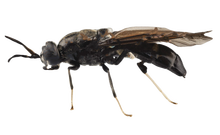The Black Soldier Fly: Nature's Recycler
The Black Soldier Fly
Our biggest ally when dealing with the global food waste crisis

The black soldier fly Hermetia illucens (L.) is a large fly (18-20 mm in length) that is distributed throughout the warm regions of the world. The adults resemble wasps in both their looks and behavior when walking; however, as flies, they have no stinger and are quite docile. Unlike many flies, they are not a nuisance to people and not known to vector any pathogens. The true power of this insect lies in the ability of it's larvae to consume almost any kind of organic waste, including grains, fruits, vegetables, meat, and mixtures of these wastes.
The black soldier fly larvae consume these unwanted materials that would otherwise be placed in landfills, converting them to biomass as protein and fat. In as little as two weeks, these larvae eat enough to grow to a size over 15,000 times larger than when they hatched from their eggs!
Once the larvae have digested the food waste, the remaining material is similar to compost, but takes significantly less time to produce (2 weeks vs months!), and serves as an excellent fertilizer for home gardens and agricultural crops.
In addition to producing a great fertilizer, the larvae themselves are useful once they complete development. Their high protein and fat content makes them a nutritious supplement for many farm-raised animals, including fish, poultry, and swine. Larvae of the black soldier fly are currently the only insect approved for use as feed for one group of commercially-raised animals: salmon, trout, and their relatives.
The black soldier fly larvae consume these unwanted materials that would otherwise be placed in landfills, converting them to biomass as protein and fat. In as little as two weeks, these larvae eat enough to grow to a size over 15,000 times larger than when they hatched from their eggs!
Once the larvae have digested the food waste, the remaining material is similar to compost, but takes significantly less time to produce (2 weeks vs months!), and serves as an excellent fertilizer for home gardens and agricultural crops.
In addition to producing a great fertilizer, the larvae themselves are useful once they complete development. Their high protein and fat content makes them a nutritious supplement for many farm-raised animals, including fish, poultry, and swine. Larvae of the black soldier fly are currently the only insect approved for use as feed for one group of commercially-raised animals: salmon, trout, and their relatives.
ServicesSupport |
About |


